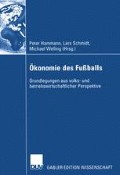Zusammenfassung
Zu Beginn der Saison 1995/96 wurde in deutschen Fußball-Ligawettbewerben1 das Punkteschema geändert:2 Für einen Sieg werden seitdem statt zwei nun drei Punkte vergeben; für ein Remis gibt es weiterhin einen Punkt und für eine Niederlage null Punkte. Ziel dieser Änderung war die Erhöhung der Attraktivität des Fußballs durch die Förderung des offensiven Spiels.3 Eine solche Regeländerung stellt die — in der Ökonomie seltene — Möglichkeit dar, quasi unter Laborbedingungen ein Experiment durchführen zu können. Es soll hier untersucht werden, inwieweit diese Regeländerung erwarten lässt, das gewünschte Ziel zu erreichen.
Für die Bereitstellung von Daten dankt der Autor der IMP-GmbH („Ran-Datenbank“). Für Forschungsassistenz dankt der Autor Herrn Dipl.-Ök. Olaf Siegmund.
Access this chapter
Tax calculation will be finalised at checkout
Purchases are for personal use only
Preview
Unable to display preview. Download preview PDF.
Literaturverzeichnis
Baik, Kyung H./Shogren, Jason F. : Strategic Behavior in Contests: Comment, in: American Economic Review, 82. Jg. (1992), S. 359–362.
Büch, Martin-Peter/Frick, Bernd : Sportökonomie: Erkenntnisinteresse, Fragestellungen und praktische Relevanz, in: Betriebswirtschaftliche Forschung und Praxis, 51. Jg. (1999), S. 109–123.
Cabral, Luis M.B. : Football, Sailing, and R&D: Dynamic Competition with Strategic Choice of Variance and Covariance, mimeo, New York University, Februar 2002.
Correira Guedes, José/Machado, Fernando S. : Changing Rewards in Contests: Has the Three-Point Rule Brought More Offense to Soccer?, in: Empirical Economics, 27. Jg. (2002), S. 607–630.
Cournot, Augustin : Recherches sur les principes de la théorie des richesses, Paris 1838. Wiederabdruck der Kapitel 5 und 6 unter dem Titel: Of Monopoly and of the Influence of Taxation on Commodities Produced under an Monopoly, übersetzt von Bacon, N.T., in: Musgrave, R.A., Shoup, C.S. (Hrsg.), Readings in the Economics of Taxation, Homewood, Ill., 1959, S. 240–256.
Dekel, Eddie/Scotchmer, Suzanne : On the Evolution of Attitudes Towards Risk in Winner-Take-All Games, in: Journal of Economic Theory, 87. Jg. (1999), S. 125–143.
Dixit, Avinash : Strategic Behavior in Contests, in: American Economic Review, 77. Jg. (1987), S. 891–898.
Dobson, Stephen/Goddard, John: The Economics of Football, Cambridge 2001.
Hvide, Hans K./Kristiansen, Eirik G. : Risk Taking in Selection Contests, mimeo, Norwegian School of Economics and Business, November 2001.
Klotz, Stefan : Wem nützt der dritte Punkt?, in: uni’kon 04.2001, S. 4–6.
Klotz, Stefan/Gerhard, Frank : Three May Be Less Than Two — The Impact of Reward Systems on the Strategy of Soccer Teams, mimeo, COFE, Universität Konstanz, Juni 2000.
O’Keeffe, Mary/Viscusi, W. Kip/Zeckhauser, Richard J. : Economic Contests: Comparative Reward Schemes, in: Journal of Labour Economics, 2. Jg. (1984), S. 27–56.
Palomino, Frédéric/Rigotti, Luca/Rustichini, Aldo : Skill, Strategy and Passion: An Empirical Analysis of Soccer, Center Discussion Paper, Tilburg University, Mai 2001.
Sahi, Siddhartha/Shubik, Martin : A Model of a Sudden-Death Field-Goal Football Game as a Sequential Duel, in: Mathematical Social Sciences, 15. Jg. (1988), S. 205–215.
Author information
Authors and Affiliations
Editor information
Rights and permissions
Copyright information
© 2004 Deutscher Universitäts-Verlag/GWV Fachverlage GmbH, Wiesbaden
About this chapter
Cite this chapter
Hundsdoerfer, J. (2004). Fördert die Drei-Punkte-Regel den offensiven Fußball?. In: Hammann, P., Schmidt, L., Welling, M. (eds) Ökonomie des Fußballs. Deutscher Universitätsverlag. https://doi.org/10.1007/978-3-322-90523-9_6
Download citation
DOI: https://doi.org/10.1007/978-3-322-90523-9_6
Publisher Name: Deutscher Universitätsverlag
Print ISBN: 978-3-322-90524-6
Online ISBN: 978-3-322-90523-9
eBook Packages: Springer Book Archive

